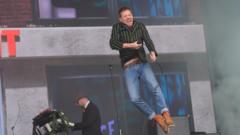Can a 48-Year-Old Music Snob Really Love Olivia Rodrigo?

## The Evolution of Pop Music: A Journey Through Generations
### Summary
Pop music has the remarkable ability to transcend generations, creating a bridge between the past and present. It often evokes nostalgia while simultaneously showcasing the fresh sounds of youth culture. This article explores the evolution of pop music, its cultural significance, and the experiences of both older and younger generations as they navigate this vibrant genre. From the classic hits of the 60s and 70s to the contemporary alt-pop and punk-pop sensations, we will delve into the intricacies of what makes pop music resonate with listeners of all ages.
### The Roots of Pop Music
Pop music originated in the mid-20th century, encapsulating various styles that appealed to a broad audience. The term "pop" is derived from "popular music," and it has evolved significantly over the decades.
#### Key Characteristics of Early Pop Music
- **Melodic Hooks**: Early pop songs often featured catchy melodies that were easy to remember.
- **Simple Lyrics**: The lyrics were usually straightforward, focusing on themes of love, relationships, and everyday experiences.
- **Instrumentation**: A typical pop song utilized instruments like guitars, pianos, and brass, which contributed to its infectious sound.
### The 1960s and 1970s: The Birth of Modern Pop
The 1960s and 1970s marked a transformative period for pop music. Artists like The Beatles and The Beach Boys redefined the genre, introducing innovative sounds and complex harmonies.
#### The Beatles: Pioneers of Pop
The Beatles revolutionized music with their groundbreaking approach to songwriting and recording. They experimented with various genres, from rock to psychedelia, which paved the way for future pop artists.
#### The Influence of Disco
The late 1970s saw the rise of disco, characterized by its danceable beats and lavish production. Artists like Donna Summer and the Bee Gees became synonymous with the disco movement, influencing pop's direction for years to come.
### The 1980s: The Era of Synth and MTV
The 1980s brought a new wave of pop music, largely influenced by the advent of music videos and synthesizers. MTV played a pivotal role in popularizing artists and shaping the visual aspect of music.
#### Iconic Artists of the 80s
- **Michael Jackson**: The "King of Pop," Jackson's groundbreaking music videos and chart-topping hits changed the landscape of pop music.
- **Madonna**: Often referred to as the "Queen of Pop," Madonna pushed boundaries with her provocative images and innovative sound.
### The 1990s: The Rise of Boy Bands and Girl Groups
The 1990s introduced a new generation of pop stars, characterized by the emergence of boy bands and girl groups. Groups like Backstreet Boys and Spice Girls dominated the charts, becoming cultural phenomena.
#### The Role of R&B in Pop
R&B artists, such as Whitney Houston and Mariah Carey, also made significant contributions to the pop genre, blending soulful vocals with catchy pop melodies. Their influence continues to be felt in contemporary music.
### The 2000s: The Birth of Digital Pop
With the rise of the internet and digital downloads, the 2000s marked a significant shift in how music was consumed and produced. Artists like Britney Spears and NSYNC became household names, dominating the airwaves.
#### The Impact of Reality TV
Reality television programs like "American Idol" introduced a new platform for aspiring pop stars. Artists like Kelly Clarkson and Carrie Underwood emerged, showcasing their talents to millions.
### The 2010s: Genre Blending and the Rise of Alternative Pop
As pop music continued to evolve, artists began to blend different genres, creating a more diverse sound. The emergence of alt-pop and punk-pop marked a shift in mainstream music.
#### Key Artists of the 2010s
- **Taylor Swift**: Starting in country music, Swift transitioned to pop, showcasing her versatility as an artist.
- **Olivia Rodrigo**: A representative of Gen Z, Rodrigo's heartfelt lyrics and catchy melodies resonate with young audiences.
### The Cultural Significance of Pop Music
Pop music serves as a reflection of societal trends and cultural movements. It often addresses issues of identity, love, and social justice, making it a powerful medium for self-expression.
#### Bridging Generational Gaps
Pop music has the unique ability to bring together people from different generations. For example, a parent might initially dismiss their child's favorite artist but later find themselves captivated by the music during a live concert. This shared experience fosters connection and understanding.
### The Live Concert Experience
Attending a live concert can be a transformative experience, providing a sense of community that transcends age and background. The electrifying atmosphere, collective singing, and emotional highs create lasting memories.
#### A Personal Anecdote
Imagine a middle-aged parent accompanying their teenager to see Olivia Rodrigo live. Initially skeptical, the parent may find themselves swept up in the energy of the crowd, singing along to hits like "Vampire" and "Good 4 U." This moment of connection with their child highlights the power of music to bridge generational divides.
### The Future of Pop Music
As technology continues to evolve, so too will pop music. The rise of social media platforms like TikTok has already changed how music is discovered and consumed.
#### Emerging Trends
- **Collaborative Efforts**: Artists are increasingly collaborating across genres, resulting in innovative sounds.
- **Diversity in Representation**: The pop industry is becoming more inclusive, showcasing artists from various backgrounds and cultures.
### FAQs
#### What defines pop music today?
Pop music today is characterized by catchy melodies, relatable lyrics, and a blend of various genres. It often incorporates elements from R&B, hip-hop, and electronic music.
#### How has technology influenced pop music?
Technology has revolutionized how music is produced, distributed, and consumed. Streaming services, social media platforms, and music production software have made it easier for artists to reach audiences.
#### Who are some of the most influential pop artists of the 21st century?
Some of the most influential pop artists of the 21st century include Taylor Swift, Ed Sheeran, Billie Eilish, and Olivia Rodrigo. Each has made significant contributions to the evolution of pop music.
### Conclusion
Pop music is a dynamic and ever-evolving genre that reflects the voices and experiences of each generation. As we continue to navigate changes in technology, culture, and society, pop music will undoubtedly adapt and thrive. Whether you're a longtime fan or a newcomer, the joy of discovering new sounds and connecting with others through music remains timeless.
What are your favorite pop songs from different eras, and how do they resonate with you? #PopMusic #MusicEvolution #GenerationalConnection
Published: 2025-06-28 09:54:25 | Category: Entertainment



